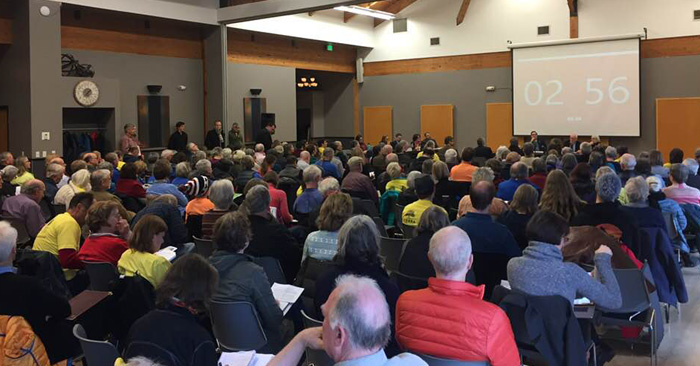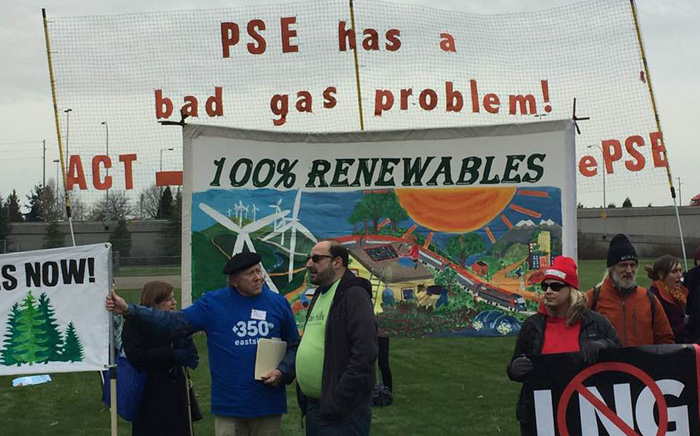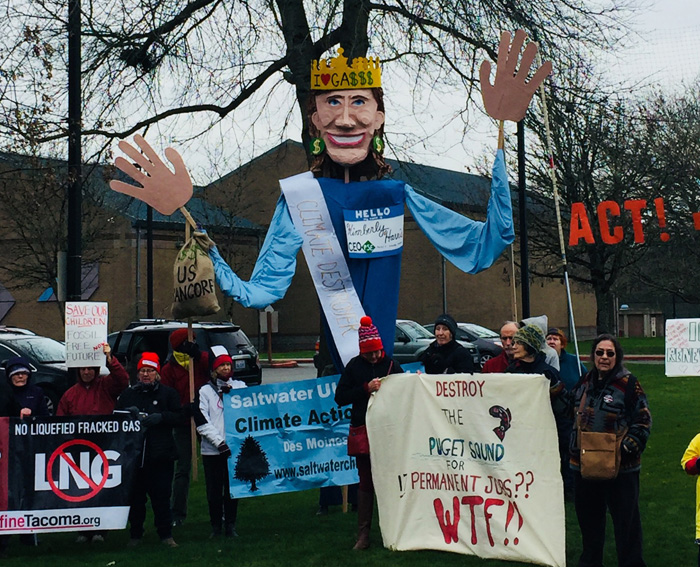OK, as for those acronyms... PSE is Puget Sound Energy. An IRP is an “integrated resource plan.” And on February 21, the Sierra Club’s Carbon-Free PSE campaign helped turn out 400 people to a public hearing held by the Washington Utilities and Transportation Commission (UTC) on Puget Sound Energy’s integrated resource plan and urge a transition to 100 percent renewable energy. That's Cesia Kearns of the Sierra Club's Beyond Coal campaign speaking at the rally, above.
“Of the 400 participants, 150 people testified,” says Seattle-based Sierra Club organizer Jessica Koski. “It was a new record for our campaign. Everyone from college students to grandmothers, high school teachers to elected officials, suburbanites to urban dwellers, and grid- and clean-energy experts to tribal council members took part. Together, they delivered a clear clean-energy message to the UTC commissioners.”

The Carbon-Free PSE campaign has been working for years to retire PSE’s Colstrip coal plant, the largest source of carbon pollution in the Northwest. Located near Billings, Montana, the plant—which releases more than 18 tons of CO2 annually, along with insidious fine-particle pollution that exponentially increases the risk of heart and respiratory ailments in area residents—supplies two-thirds of PSE’s power.
Activists urged the UTC commissioners to reject any long-term plan from PSE that fails to explicitly address getting coal-fired electricity from the Colstrip plant off PSE’s grid by 2025, and exclude liquefied natural gas and all new fracked-gas infrastructure. Elected officials from throughout PSE’s service area testified (see list at the end of this post), as did Montana State Representative Denise Hayman, who made a strong case for Montana wind, which peaks when Washington State’s need for electricity is highest.
The first time the Sierra Club put together a Carbon-Free PSE rally at a UTC hearing, in 2011, a dozen people attended. In 2013, more than 80 people testified; and in 2015 the number grew to 130. “Showing up at this hearing every two years is a powerful reminder to the Commission that the movement for clean energy and climate action is growing stronger every day,” Koski says. “But beyond the sheer number of participants, this year’s hearing was significant because it’s the first time three distinct campaigns targeting PSE’s dirty energy projects have come together and mobilized collectively.”

This troika includes the Carbon-Free PSE campaign; Redefine Tacoma and allies like 350 Tacoma who are fighting PSE’s proposed liquefied natural gas terminal in Tacoma; and the Coalition of Eastside Neighborhoods for Sensible Energy (CENSE), which advocates for sustainable energy in King County, where Seattle is located.
"The Carbon-Free PSE campaign has united a group of stakeholders with widely different priorities and turned 400 of them out to a regulatory meeting in the middle of a weekday in the suburbs," says Koski's colleague and fellow organizer Caleb Heeringa. "It's a testament to what can be accomplished when different campaigns collaborate to achieve their shared goals."
“These three campaigns share a vision for a fossil-fuel free future and a deep passion for making Washington a regional and national clean energy leader,” Koski says. “It was this collaboration that enabled us to draw a record number of participants to the UTC hearing, and it also made for a fantastic pre-hearing rally.”

Dakota Case, a member of the Puyallup tribe, whose lands and public health are threatened by PSE’s proposed liquid natural gas terminal, was the master of ceremonies at the rally. Speakers included Puyallup tribal council members; Jerry Cufley with Washington Physicians for Social Responsibility; Montana State Rep. Hayman and fellow Montanan Sergeant Major Mike Jarnevic; Cesia Kearns of the Sierra Club’s Beyond Coal campaign; and David Schwartz of CENSE.
“This effort is already paying off,” Koski says. ”The commissioners called out PSE for inflating the cost of solar power during the utility’s presentation of its plan, citing public comment. The impact of those public comments is also clear in UTC staff’s initial responses to PSE’s integrated resource plan. Most significantly, UTC staff called on Puget Sound Energy to include the social cost of carbon, as well as the monetized cost of health impacts, in its next planning cycle. We’re optimistic that the time isn't far off when PSE stops using coal.”
Koski gives a special shout-out to Sierra Club volunteers Kevin Jones and Rob Briggs, and Club organizers Cesia Kearns, Victoria Leistman, Doug Howell, Caleb Heeringa, Mike Scott, Robin Everett, and Stephanie Hillman. Elected officials from PSE’s service area who testified included King County Executive Dow Constantine; Olympia Mayor Pro-Tem Nathaniel Jones; Kirkland Deputy Mayor Jay Arnold; and Bellingham City Council Member Michael Lilliquist.
